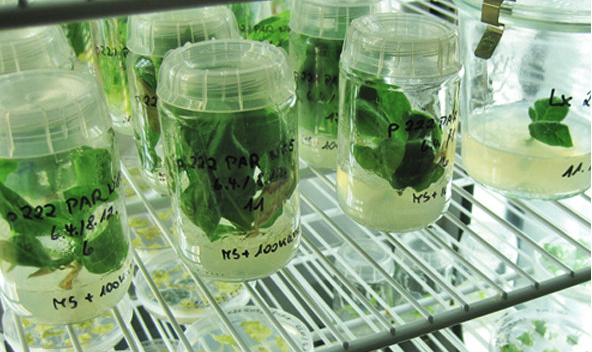
EU starts consultation on novel plant breeding methods
The EU Commission has launched its final consultation on the deregulation of new breeding techniques in agriculture.
he EU Commission has launched its final consultation on the deregulation of new breeding techniques in agriculture.
A study commissioned by the Commission and published a little over a year ago by the JRC, which reports to the EU, concluded that stress-resistant crops bred by targeted mutagenesis could be helpful in the fight against climate change. Since varieties bred in this way are not measurably different from those whose mutations were triggered by chemicals or radiation, the Commission recommended that the new varieties be exempted from EU legislation on genetic engineering. Curiously, the final consultation on the adaptation of genetic engineering law is not only about really new technologies that allow targeted mutagenesis, such as the gene scissors CRISPR-Cas or ODM, but also about old methods such as cisgenesis.
Against this background, the criticism of non-governmental organisations such as GLOBAL 2000 seems justified that the Commission is not concerned with creating a democratic and consumer-acceptable choice between GMO-free and climate-friendly, but only with serving the interests of financially strong lobbyists from industry and science. These are pushing for deregulation because the lack of market acceptance for labelled GM products has so far prevented their success in Europe.
The Austrian NGO GLOBAL 2000 criticises in particular that the EU citizens, who are very determined about genetic engineering in food, are apparently to be influenced by leading questions in the survey. According to the agro-ecologist Dr. Monika Messner, breeding expert at the Swiss Research Institute for Organic Agriculture, only one of the three proposals discussed (special regulation within the EU genetic engineering law) even contains the possibility of a labelling obligation for the new breeds. This transparency is critical in order to ensure that consumers are not being sold something they do not want. Proposals such as equal treatment of genetically mutagenised varieties with conventional ones ignore this wish in favour of the trade and logisticians, who want to have both as easy as possible.
Only a third of the new varieties benefit farmers alone, who make too little profit if they use the agro-ecologically more advantageous organic plants instead of the pest-resistant and pesticide-tolerant "precision breeding", which makes sense from an agricultural economic point of view. The breeding of the much-cited climate-stress-resistant new varieties is also
As part of a policy initiative on plants obtained through targeted mutagenesis and cisgenesis, a consultation has now been launched as an important source of information for the Commission. The consultation will run until 22 July. A similar last public consultation was blocked by opponents with a barrage of identical responses.
It reads as unwieldy as ever what the EU has put on the internet as a public "consultation". One
"Initiative on plants derived from certain novel genomic techniques" would also affect ordinary citizens in the EU and beyond. This initiative would affect a wide range of interests in agriculture, food and feed, plants, the environment, sustainability, biotechnology in general and the use of targeted mutagenesis and cisgenesis in plants, including and in particular in relation to food and feed derived from them.
As the EU Commission was preparing a policy initiative on plants derived from targeted mutagenesis and cisgenesis, the consultation had been opened as an important source of information for the Commission’s initiative. It "aims to gather the views of citizens and stakeholders on the functioning of the current GMO legislation on plants derived from targeted mutagenesis and cisgenesis and on food and feed produced from them under the current GMO legislation, as well as on possible options for a new regulatory framework." The initiative explicitly aims to reform regulatory oversight of the plant products concerned while maintaining a high level of protection for human and animal health and the environment. It also aims to enable innovation and contribute to the objectives of the European Green Deal and the Farm-to-Table strategy with safe NGT products.
Relevant NGOs such as VLOG already fear an undue bias on the part of the questioners and see the "seal of approval" GMO-free in danger. After all, one question is probably aimed at finding out whether a modern genetic breeding method could not also be a "seal of approval".climate-friendly, but only with serving the interests of financially strong lobbyists from industry and science.



 adobe.stock.com - ipopba
adobe.stock.com - ipopba BioDlink
BioDlink